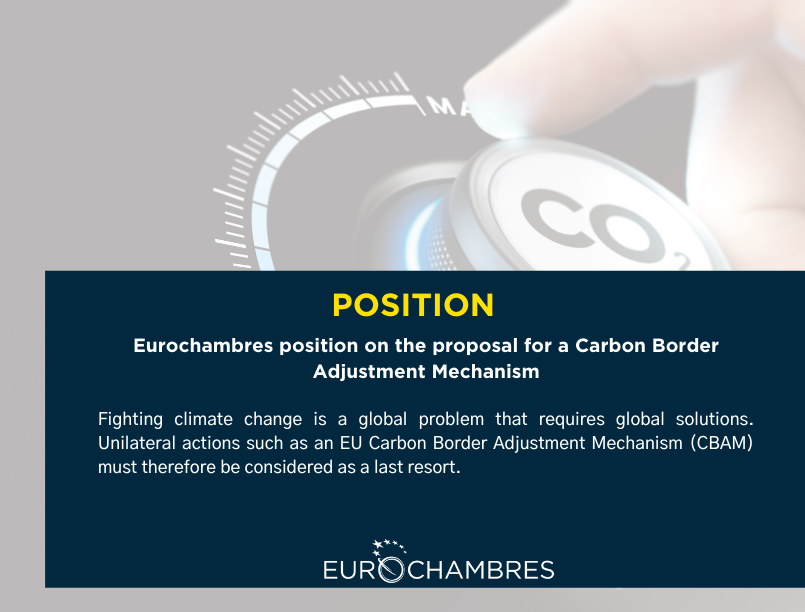Eurochambres position on the proposal for a Carbon Border Adjustment Mechanism (CBAM)
Fighting climate change is a global problem that requires global solutions. Unilateral actions such as an EU Carbon Border Adjustment Mechanism (CBAM) must therefore be considered as a last resort.
Experience shows that unilateralism, especially if it has major impacts on third countries, tends not to remain unanswered, with unforeseen economic consequences for companies. It is critical therefore that the EU manages this process very carefully and transparently with its trading partners. Any opaque, disproportionate and uncoordinated process will increase the risk of retaliation at a time when the European economic recovery must be a priority.
It is clear, however, that addressing climate is increasingly urgent also for the business community. For Eurochambres, the EU Emissions Trading System (ETS) must remain at the centre of European climate policy, as it has proven to be effective while allowing companies to choose how to meet the target. As a result, the most cost-efficient measures are implemented, competition is stimulated, and innovation is encouraged.
The ETS must go hand in hand with an effective instrument to avoid carbon leakage. Even before the adoption of the fitfor55 package last year, European companies, in particular energy-intensive ones that are exposed to global competition, faced higher environmental compliance costs than foreign competitors and companies in some sectors were relocating outside the EU. The fact that some countries have a less ambitious climate regulation framework creates an unlevel playing field; this must be avoided, not just to safeguard European competitiveness but also to reinforce the global response to climate change.
In this context, it is important that the current system of free allowances is maintained, as it creates a strong incentive for businesses to invest in cleaner technology and maintain the EU industrial base. They also aim at maintaining the effectiveness and integrity of the EU-wide climate and environment framework, since the same manufacturing processes often result in higher emissions in third countries with less stringent regulation. As long as comparable climate ambitions are not in place and implemented in other world regions, this instrument remains pivotal for the global competitiveness of European industries.
To retain industry in Europe, the Commission must step up and strongly advocate for global action, next to the CBAM proposal. Although more countries are declaring goals on climate neutrality, this is not yet automatically translating into measures, whereas Europe is already progressing with implementation. Europe should remain a leader in climate response, but it must also ensure that others follow, particularly through capitalising on international structures such as G7, G20, or COP 27.
Lastly, any CBAM mechanism should be easy to administer, not place undue burdens on SMEs and be applied to selected sectors based on a proper impact assessment to determine the often complex dependencies of the entire value chain.
